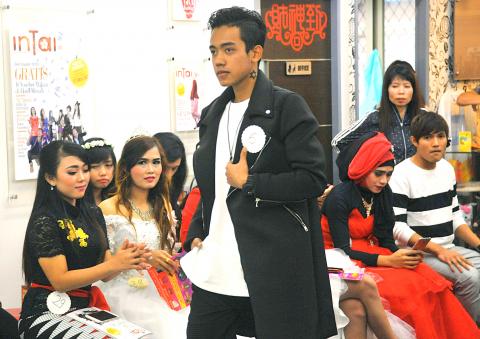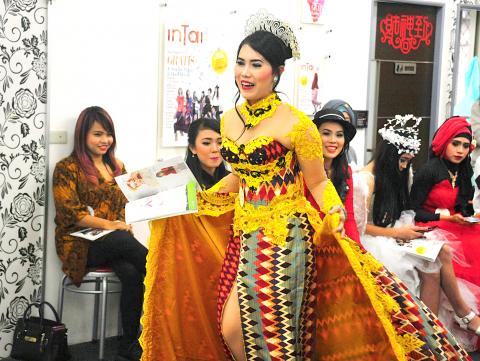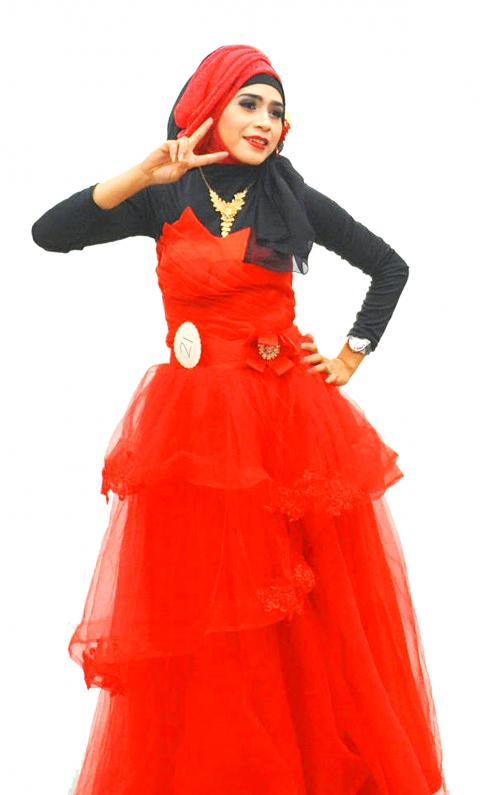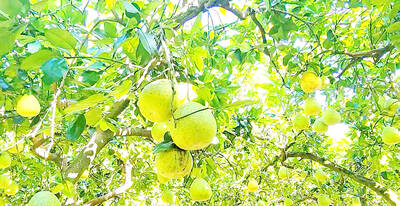Rafael Febriant is in a celebratory mood. Having just made the cover of InTai, an Indonesian-language magazine that appears in most Indonesian shops in Taiwan, the honor will move him one step closer to achieving his dream of fame and fortune.
“I am very happy now that many Indonesian people recognize me in Taiwan,” he says of being a cover model and the accompanying feature story written about his life, interests and aspirations.
Febriant, 21, dreams of becoming a wedding stylist or entertainer, but for now he still works long hours as a welder in a factory in Taichung. Earlier this month, he put on his best clothes, channeled his swagger and beat out more than 100 hopefuls at InTai’s monthly pageant to earn this opportunity, one that many Indonesians in Taiwan probably wouldn’t have in their home country.

Photo: Han Cheung, Taipei Times
“Many of them don’t come from big cities, and come here right after high school to work as domestic helpers,” Intai founder Deyantono says. “They won’t have this chance.”
Febriant is making the most of his victory. Just in the past few weeks, he’s starred in a couple of Internet advertisements for products targeteing the 237,610 Indonesians working in Taiwan — over 40 percent of the nation’s foreign employees — and sang at an event in Taichung.
DRESSED TO KILL

Photo: Han Cheung, Taipei Times
Sitting in chairs on each side of the makeshift “catwalk” in InTai’s small office are contestants dressed in various styles, ranging from the modest hijab and long gown to some pretty outrageous outfits and heavy makeup. One woman is dressed as a Japanese schoolgirl and professes her penchant for the “kawaii” style. Another flaunts a revealing Javanese-style gown with an extra long hem, while yet another is dressed in a white wedding-style costume with a multi-layered white-leaf headdress and angel wings.
Brimming with confidence, Febriant struts down the runway, even volunteering to demonstrate his routine to this reporter before the contest begins. He says he grew up in an environment familiar with modeling, as his father is a photographer and his mother a stylist. Later, he belts out a song on stage during a raffle for face cream and international phone cards.
At the end of the catwalk is a man with a cellphone, toward which the contestants introduce themselves on live broadcast via Facebook. Then they pose for photos while holding the magazine. Some are pretty bold — one contestant drops to the ground and crawls toward the photographer.

Photo: Han Cheung, Taipei Times
A four-person panel of judges, comprised of Deyantono and representatives from partnering businesses, will choose the top 10. The winner is determined by public voting on Facebook.
“If you don’t have a lot of friends, you can’t win,” Deyantono quips.
With nearly 5,000 Facebook friends, Febriant doesn’t have that problem. Neither does runner-up Erwina, who is somewhat of an Internet celebrity with more than 6,000 followers on Facebook. She spends her monthly day off traveling to sites such as Jiufen and Keelung where a friend takes photos of her in different costumes, which she uploads to Facebook to maintain her fan base.

Photo: Han Cheung, Taipei Times
THE BUSINESS SIDE
InTai magazine has featured Indonesians living in Taiwan on its cover since its inception 10 years ago. Deyantono’s competitors have closed down over the years due to the Internet, but he carries on because of a comment a Taiwanese friend made before the magazine started.
“He said that there are publications for other migrant groups but not Indonesians because we aren’t as smart,” he says. “He wasn’t serious, but it really made me sad. So as long as I am not losing money, I will keep doing it.”

Photo: Han Cheung, Taipei Times
However, revenues have been dropping, and Deyantono needed a way to cut costs. Before, they would call for photo submissions, choose one applicant and invite him or her to the studio for a photoshoot and interview.
“We had to hire professional photographers and stylists, and it cost a lot of money and time,” Deyantono says. “Now they come dressed up with their makeup done, and our photographer can just take the photos on the spot.”
However, he did not expect the event to become so popular.
Febriant acknowledges that he probably wouldn’t have this type of “celebrity” opportunity if he returned to Indonesia, but he thinks it’s a step toward his goal of eventually running a wedding business with his family back home.
“At least I’ll have the experience and achievements ... while I prepare the capital to build [my business] in Indonesia,” he says.

On Facebook a friend posted a dashcam video of a vehicle driving through the ash-colored wasteland of what was once Taroko Gorge. A crane appears in the video, and suddenly it becomes clear: the video is in color, not black and white. The magnitude 7.2 earthquake’s destruction on April 3 around and above Taroko and its reverberations across an area heavily dependent on tourism have largely vanished from the international press discussions as the news cycle moves on, but local residents still live with its consequences every day. For example, with the damage to the road corridors between Yilan and

Gaotai Mountain (高台山) and the three Daotian Peaks (小中大島田山回來) afford visitors a truly rewarding hike in Hsinchu County (新竹). Located in the foothills just beyond the charming Neiwan Old Street (內灣老街), the hike is well suited for hikers in a fair to good physical condition. It’s also a good introduction to the foothills of northwest Taiwan, along with some more adventurous — but still not terribly dangerous — rope and scrambling sections. As a bonus, there are Japanese ruins, hot springs and river tracing destinations such as Meihua Waterfall (梅花瀑布) and Bilin Waterfall (比麟瀑布) all located nearby. WHISPERING PINES The first section of

With William Lai’s (賴清德) presidential inauguration coming up on May 20, both sides of the Taiwan Strait have been signaling each other, possibly about re-opening lines of communication. For that to happen, there are two ways this could happen, one very difficult to achieve and the other dangerous. During his presidential campaign and since Lai has repeatedly expressed his hope to re-establish communication based on equality and mutual respect, and even said he hoped to meet with Chinese leader Xi Jinping (習近平) over beef noodles and bubble tea. More dramatically, as explored in the May 2 edition of this column,

Tiffany Chang (張芳瑜) is a force to be reckoned with. Crowned Miss Taiwanese American in 2022, she made history last year as the first Taiwanese winner of Miss Asia USA. She’s also a STEM student at Stanford and an aspiring philanthropist — the kind of impressive accolades that has earned her the moniker “light of Taiwan.” At the end of March, Chang returned to Taipei, to “see the people that support me because ultimately that’s what made me win.” She says her Taiwanese supporters shower her with praise: “you inspire us, and you make us feel proud of our Taiwanese heritage,”